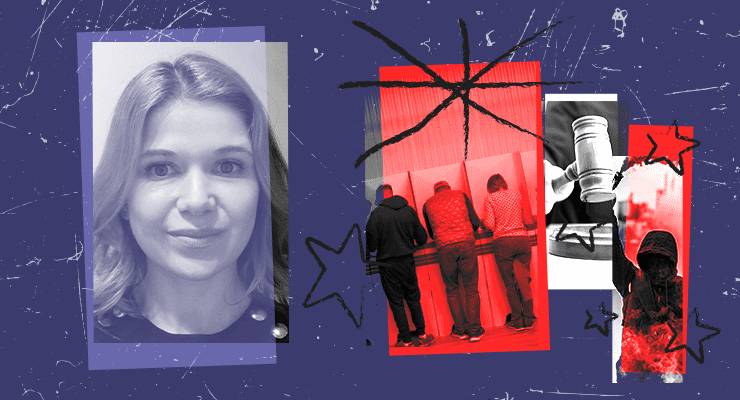
This is part six in a series. For the full series, go here.
Last month a member of the government stood up in Parliament to decry the “totalitarian path we are unquestionably on”, invoking the names of Hitler, Pol Pot, Stalin and Mao, and declared that the “solution” includes civil disobedience.
The speech capped off a remarkable year in which it has become increasingly clear that Australia is failing to heed the lessons from what happened in the United States on January 6, less than a year ago.
On one level, we will spend decades arguing over exactly how to interpret the events of that day. On another level, however, the lessons are quite simple: when people with power invoke a sense of threat and call for a violent response, even metaphorically, sometimes their followers take them at their word.
Much of the incendiary rhetoric, divisive content and conspiracy theories about fraud in the 2020 election which were being shared on social media in the lead-up to January 6 originated not with obscure online sources but with elected political leaders and major media organisations.
This febrile atmosphere built over the course of months in the fractious aftermath of the US election, culminating on January 6 with Donald Trump encouraging his supporters to march on the Capitol and telling them: “We fight like hell, and if you don’t fight like hell, you’re not going to have a country any more.”
We know what happened next.
There is a relationship between extreme words and extreme action. Political leaders and media figures may claim to be using violent language as metaphor or rhetorical flourish, but as the past year has shown under the right circumstances some of their audience may interpret it as literal.
While Australia is thankfully not in such dire straits as the US, where democracy itself is under real threat in 2024, we have nonetheless seen some of the most violent protests our cities have witnessed in decades over several months. It would be impossible to miss the influence that inflammatory media commentary has had on those protests and the anti-lockdown movement more broadly, in particular Sky News and its stable of pundits.
In September, for example, on the same day as anti-lockdown protesters clashed violently with police in Melbourne’s suburbs, Sky News broadcast comments by Gideon Rozner of the Institute of Public Affairs referring to Premier Daniel Andrews as “Dictator Dan” and claiming he is “literally trying to build COVID gulag here”. Multiple days of violent protests followed.
While of course not the sole cause of the protests, overwrought and untrue media commentary such as this helps to turn up the heat in a political climate in which the anti-lockdown stew is boiling over.
Elected political leaders have also been fuelling this fire, including members of the federal government. Senators Matt Canavan and Alex Antic have both appeared on the livestream show of Steve Bannon (who was recently indicted for refusing to comply with subpoenas relating to his role in January 6) and drawn comparisons between Australia’s health measures and authoritarianism.
MP George Christensen appeared on InfoWars, a show hosted by infamous conspiracy theorist Alex Jones, wherein Christensen did not rebut a comparison made by Jones between Australia’s quarantine facilities and Auschwitz.
Multiple Victorian opposition MPs have appeared at protests, before leader Matthew Guy banned them from attending in response to violent threats made by protesters towards Labor MPs.
Most striking of all is former Liberal MP and leader of the United Australia Party Craig Kelly, who has repeatedly appeared at anti-lockdown rallies and formed an alliance with Reignite Democracy. The rallies at which Kelly has appeared have been steeped in violent language and violent imagery, including at times overt threats made by speakers with the microphone.
Meanwhile, as Kelly sits beside his parliamentary colleagues in the chamber, on his Telegram channel his supporters are calling for those colleagues to be killed. Kelly has not intervened or spoken out directly against the daily threats made against the lives of his colleagues on his own social media channels.
These are not fringe figures. These are the people entrusted with leading our nation — and what they say matters.
There are legitimate human rights and civil liberties concerns raised by expanded government power during the COVID-19 pandemic. Overheated rhetoric and wildly inaccurate comparisons between public health measures designed to save lives and totalitarian regimes which killed millions do nothing to further that conversation — if anything, it makes it more difficult to have a reasonable, evidence-based discussion.
What it does do, however, is introduce the spectre of violence into Australian politics.
Politicians around the country report levels of harassment and threatening behaviour beyond anything they have previously seen, particularly in Victoria. Among anti-lockdown groups on social media, calls to violent action are becoming ever louder as it becomes clear that the protests are achieving little.
Australian democracy is under threat, not from some imaginary dictator but from the creeping rot of distrust in political leaders and alienation from the political process. At the extreme fringes this is manifesting in wild conspiracy theories, spurred on by politicians who present themselves as the antidote to the very system they are a part of.
Increasingly, violent language is making its way off the screens and the airwaves and on to the streets. In the distance, an election looms. Sound familiar?
Australia is not yet at the fever-pitch which preceded the invasion of the US Capitol on January 6. But we should not be so naïve as to think we are immune.








The violent terminology is endemic in sports reporting & gradually carries through to other areas. Competing teams are annihilated, decimated, crushed, walloped, whipped, thumped, thrashed etc.
Its the same in business. I find myself sitting in meetings thinking “you’d struggle to fight your way out of wet paper bag, pasty white man”, and as a pasty white man, I’d know.
Yes, the politicians and their language has certainly deteriorated over the last few years. And the rot has clearly been from the top down. Also, the political party system has become so bad that it has become the route of entry for such clowns into the parliament, where they can do most damage – although at least one has been a “captains pick” of an inept prime minister trying to dumb down the parliament to his own level.
It’s amazing, though, how similar they are to our first political assassin, who allegedly told police that he also didn’t want to be “a nobody all my life”. Thankfully, some are leaving politics to resume the status of “nobody”, and the community will be better for their departure.
I thought it was illegal to incite a riot.
Anyone surprised? Part of the imported LNP tactics or modus operandi adopted by the US GOP which has become ‘owned’ itself by radical right libertarian ‘architecture’ of think tank/lobbyist influence, with legacy media filling in the gaps, and Fox being the fringe figurehead promoting ‘sociocultural values’ to ageing monocultural electorates.
Meanwhile after Christchurch both media and LNP MPs could not see how the shooter citing the ‘great replacement’ was anything to do with Australia; backgrounded by decades of dog whistling e.g. the NOM net overseas migration obsession as out virtual ‘Trumpian wall’, denigration of Muslim refugees since Tampa etc..
A word of warning from dog whistling expert Ian Haney-Lopez of Berkeley, and coincidentally supported by UK Tory Head Baroness Warsi; it divides the middle class and nations, from Good Reads:
‘politicians and plutocrats deploy veiled racial appeals to persuade white voters to support policies that favor the extremely rich yet threaten their own interests. Dog whistle appeals generate middle-class enthusiasm for political candidates who promise to crack down on crime, curb undocumented immigration, and protect the heartland against Islamic infiltration, but ultimately vote to slash taxes for the rich, give corporations regulatory control over industry and financial markets, and aggressively curtail social services. White voters, convinced by powerful interests that minorities are their true enemies, fail to see the connection between the political agendas they support and the surging wealth inequality that takes an increasing toll on their lives. The tactic continues at full force, with the Republican Party using racial provocations to drum up enthusiasm for weakening unions and public pensions, defunding public schools, and opposing health care reform.’
Quote: “The speech capped off a remarkable year in which it has become increasingly clear that Australia is failing to heed the lessons from what happened in the United States on January 6, less than a year ago.”
Or… certain politicians HAVE heeded the lessons. Democracy is fragile, and that fragility will benefit those who hold power if they break it.